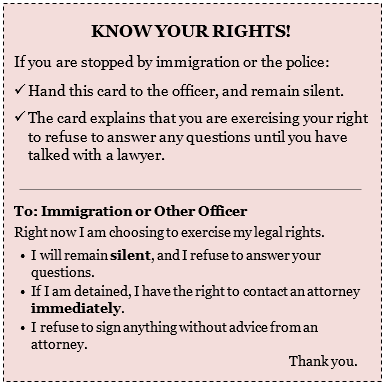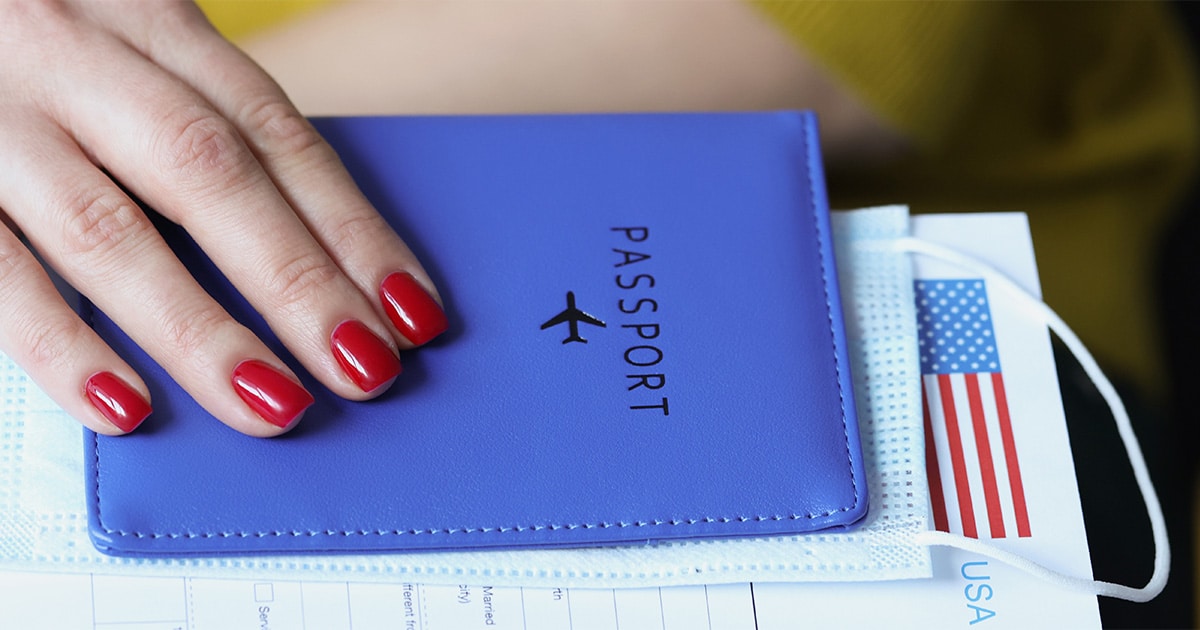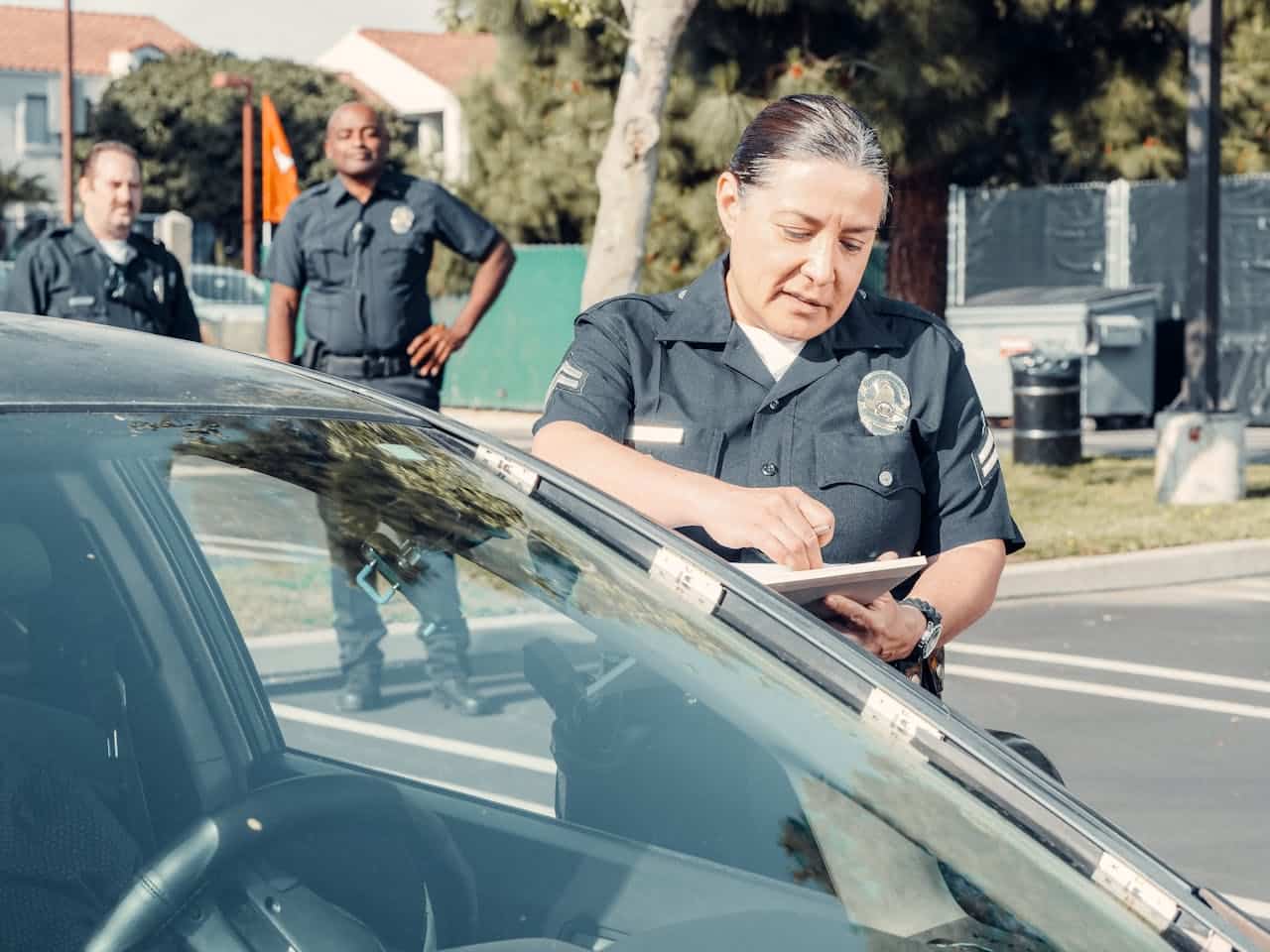If you are immigration and find out that you have to deal with Immigration and Customs Enforcement (ICE) or other law enforcement officers at home, on the street, or anywhere else, remember that you have the basic rights and immigration rights described in this factsheet. The factsheet also provides suggestions for what you should do to assert your immigration rights.
Everyone Has Certain Basic Rights, No Matter Who Is President of The United States
Donald Trump, who repeatedly made anti-immigrant promises during his campaign, and took various anti-immigration enforcement steps including building more wall along the U.S. Mexico Border. Now, 4 plus years later in the new Biden administration, immigration has taken a different turn with States getting involved in border enforcement. But no matter who is president, everyone living in the U.S. has certain basic rights including immigration rights under the U.S. Constitution—everyone, including people who are undocumented.
No matter who is president, everyone living in the U.S. has certain basic rights under the U.S. Constitution. Undocumented immigrants have basic rights and immigration rights too. It is important that we all assert and protect our basic rights.
Basic Rights & Immigration Rights
You have the right to remain silent. You may refuse to speak to immigration officers.
- Don’t answer any questions. You may also say that you want to remain silent.
- Don’t say anything about where you were born or how you entered the U.S.
Carry a know-your-rights card and show it if an immigration officer stops you.

- The card explains that you will remain silent and that you wish to speak with an attorney.
- To print the above card, click on the card’s image, then press Ctrl-P on your keyboard.
Do not open your door.
- To be allowed to enter your home, ICE must have a warrant signed by a judge. Do not open your door unless an ICE agent shows you a warrant. (They almost never have one.) If an ICE agent wants to show you a warrant, they can hold it against a window or slide it under the door. To be valid, the warrant must have your correct name and address on it.
- You do not need to open the door to talk with an ICE agent. Once you open the door, it is much harder to refuse to answer questions.
You have the right to speak to a lawyer.
- You can simply say, “I need to speak to my attorney.”
- You may have your lawyer with you if ICE or other law enforcement questions you.
Before you sign anything, talk to a lawyer.
- ICE may try to get you to sign away your right to see a lawyer or a judge. Be sure you understand what a document actually says before you sign it.
Always carry with you any valid immigration document you have.
- For example, if you have a valid work permit or green card, be sure to have it with you in case you need to show it for identification purposes.
- Do not carry papers from another country with you, such as a foreign passport. Such papers could be used against you in the deportation process.
If you are worried ICE will arrest you, let the officer know if you have children.
- If you are the parent or primary caregiver of a U.S. citizen or permanent resident who is under age 18, ICE may “exercise discretion” and let you go.
Because Donald Trump has made many anti-immigrant statements, ICE and other law enforcement officers may think they can get away with violating your rights. Sometimes ICE officers lie to people in order to get them to open their doors or sign away their rights. If ICE detains you or you are concerned that they will conduct raids in your area, this is what you can do:
Create a safety plan.
- Memorize the phone number of a friend, family member, or attorney that you can call if you are arrested.
- If you take care of children or other people, make a plan to have them taken care of if you are detained.
- Keep important documents such as birth certificates and immigration documents in a safe place where a friend or family member can access them if necessary.
- Make sure your loved ones know how to find you if you are detained by ICE. They can use ICE’s online detainee locator to find an adult who is in immigration custody. Or they can call the local ICE office. Make sure they have your alien registration number written down, if you have one.
- You can call the Executive Office for Immigration Review (EOIR) hotline number at 240-314-1500 or 1-800-898-7180 (toll-free) 24 hours a day, 7 days a week to get information on your case’s status.
Report and document raids and arrests.
- If it is possible and safe for you to do so, take photos and videos of the raid or arrest. Also take notes on what happened.
- Call United We Dream’s hotline to report a raid: 1-844-363-1423.
- Send text messages to 877877.
Learn more about your rights.
- Read NILC’s tips on how to prepare for a raid—in English or Spanish.
- Read resources and booklets in English and Spanish by the American Friends Service Committee and Casa de Maryland: https://www.afsc.org/category/topic/know-your-rights.
Find Legal Help in Dallas
If you or a loved one has been detained by immigration authorities or charged with criminal conduct by the police or sheriff in Dallas, Texas, contact 214 Release: Hindieh Law for a free case evaluation.
Call our immigration and crimmigration attorneys at 214-Release (214.960.1458) for a free confidential consultation today.






